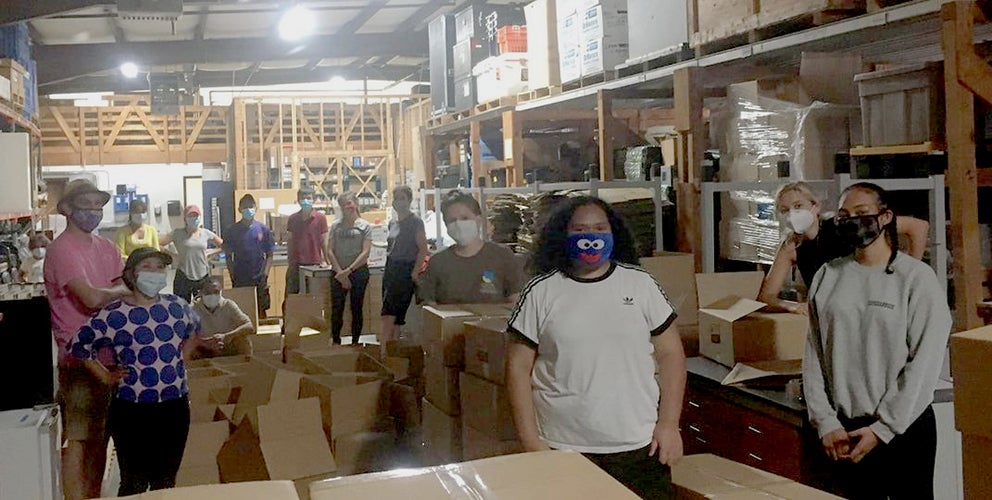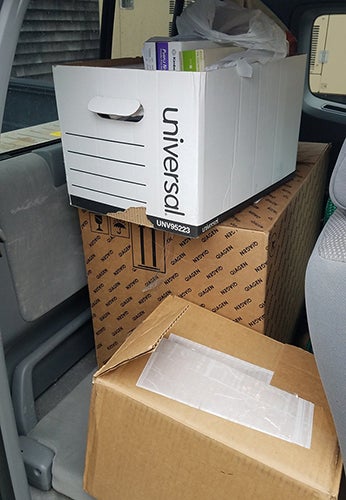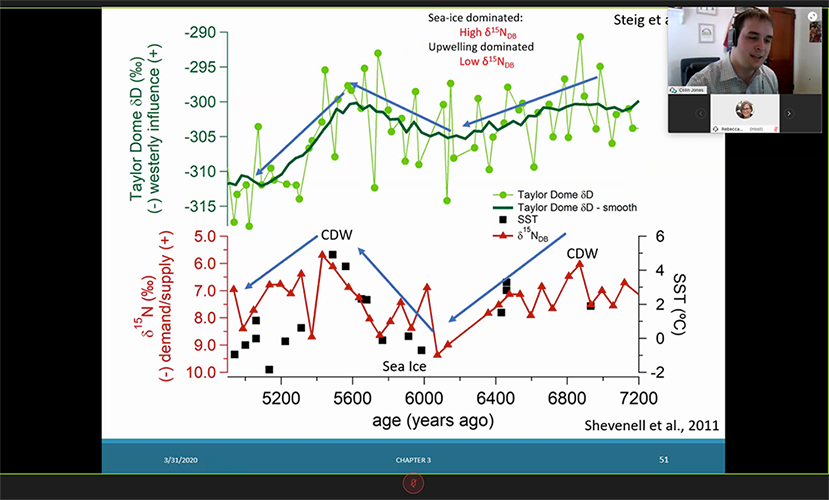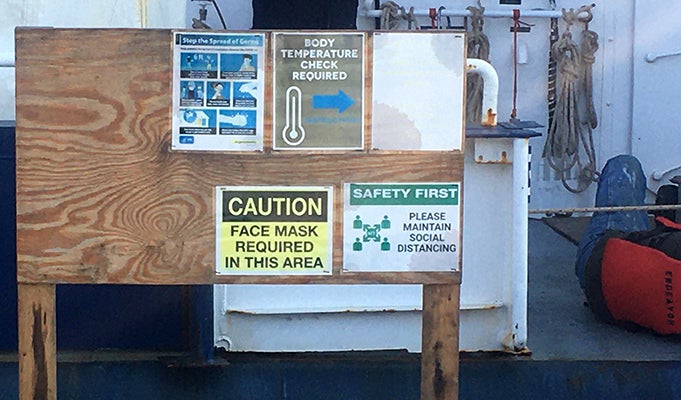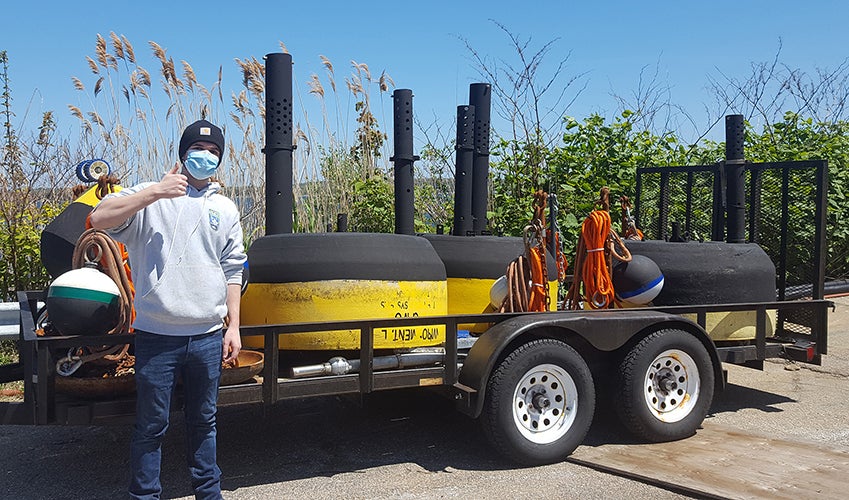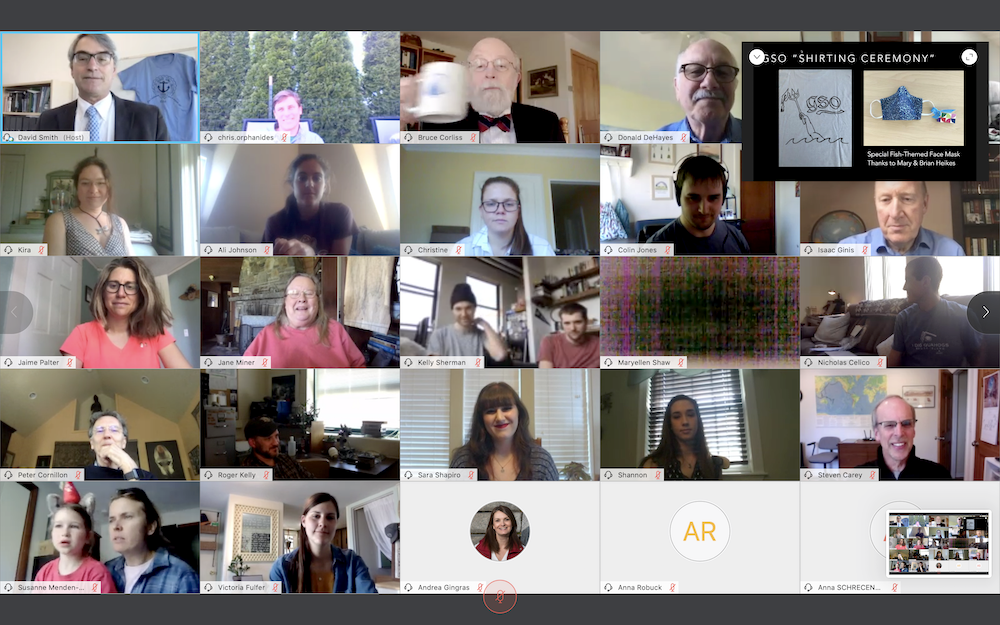
By Veronica M. Berounsky
March 13 would be the last normal day of 2020 on the University of Rhode Island Narragansett Bay Campus due to the COVID-19 pandemic.
When Graduate School of Oceanography faculty, students and staff left campus at the end of the day, they knew face-to-face classes were cancelled and online classes would start two weeks later. Then on March 15, former Dean Bruce Corliss announced that, except for essential employees, all members of the GSO community were encouraged to work remotely to help stop the spread of the coronavirus.
Just as it would throughout the world, life on the Bay Campus was about to change in ways no one could have anticipated. Here are just a few stories of how the resilient, creative and dedicated GSO community reacted and adapted.
GSO Community Immediately Responds to COVID-related Health Needs
Faculty, students and staff went to work to help address pressing COVID-19 public health needs. The community gathered and delivered needed medical supplies, produced and shared plans for building face shields, and used 3-D printing technology for ventilator part modifications and fabrication.
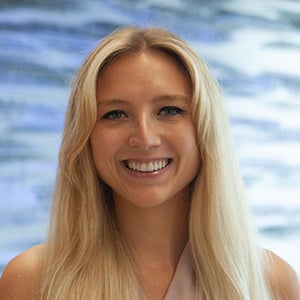 GSO student Laura Glastra studied microplastics for a side project and used that expertise to design a method to disinfect the reconfigured machines with ozonolysis. “The original method they’d been using to disinfect and sanitize the plastic components and water chambers was through autoclaving, which was damaging the structure of the materials. So researching the polymer species and identifying a non-destructive means of disinfecting and sanitizing was useful to recycle the donated materials in a safe way.”
GSO student Laura Glastra studied microplastics for a side project and used that expertise to design a method to disinfect the reconfigured machines with ozonolysis. “The original method they’d been using to disinfect and sanitize the plastic components and water chambers was through autoclaving, which was damaging the structure of the materials. So researching the polymer species and identifying a non-destructive means of disinfecting and sanitizing was useful to recycle the donated materials in a safe way.”
Others involved with this project included GSO alum Christine Gardiner, professor Jaime Palter, ship technician Lynne Butler and marine research associate Roger Patrick Kelley.
Assisting the State’s Fishing and Aquaculture
Rhode Island Sea Grant (RISG) responded to the needs of the state’s fishing and aquaculture industries by purchasing infrared thermometers to help monitor crew member health, encouraging the purchase of local seafood for home consumption, and working with the aquaculture industry to identify ways they might benefit from technical training and support. RISG, along with the Coastal Resources Center (CRC) worked with business experts and aquaculture industry leaders such as GSO alum Robert Rheault (Ph.D. 1994), Executive Director of the East Coast Shellfish Growers Association, to assess industry needs and organize training and support for the development of new websites, direct sales, and other business innovations that will help them weather COVID-19 and future disruptions.
Seminars and Events Move Online
You knew things were serious when the 40th Anniversary GSO Harpoon Seminar on April Fools Day was cancelled, along with all the other seminars and workshops for the spring semester. These events later resumed online but there was no mingling over coffee and donuts or talking to the speaker over lunch. The one advantage of virtual seminars and events was that people all over the world could participate.
Dissertations and thesis defenses had to go on, and did so virtually. Colin Jones was first to defend a GSO Ph.D. online and Allie Johnson was first to defend a masters of science in that manner.
On May 15, Colin, Allie and the 10 other recent GSO graduates were recognized at the virtual GSO Shirting Ceremony and received their coveted “Don’t Give Up Hope” t-shirt. The silver lining of the online ceremony was that the graduates, their colleagues, friends and family could join the celebration, so even those who have gone on to jobs or postdocs across the U.S. and in foreign countries participated.
Abrupt Transition to Online Classes
With only seven days to prepare, all URI classes became online courses. The transition for GSO’s undergraduate and graduate classes went relatively smoothly, but problems were inevitable with such a dramatic shift. Two GSO faculty members shared their experiences.
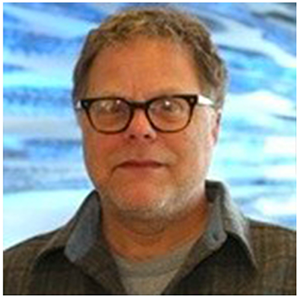 Arthur Spivack: “This past spring I taught a small graduate class with GSO professor Katherine Kelley. With a few highly motivated students, my section of the class was run in seminar style with a lot of discussion. I think the students made the best of a difficult situation and learned a lot.
Arthur Spivack: “This past spring I taught a small graduate class with GSO professor Katherine Kelley. With a few highly motivated students, my section of the class was run in seminar style with a lot of discussion. I think the students made the best of a difficult situation and learned a lot.
“This fall, I’m co-teaching an introductory level undergraduate class with GSO professor Chris Kincaid. This class has more students than ever, but with the hard work of teaching assistants Loes van Dam and Riley Secor, both GSO students, we’ve overcome not having the direct, face-to-face interaction with students that helps me gauge how well they are engaging and grasping the material. Instead we have relied on numerous quizzes to check how the students are following our lectures.
“It’s been easier for an older professor like me to cope with the online transition than it has been for my colleagues who have young children. I didn’t have 24/7 child care and schooling at the same time.”
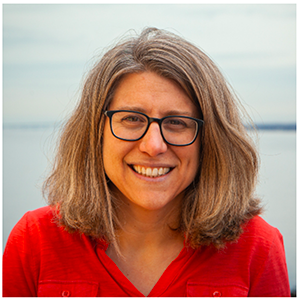 Jaime Palter: “The pivot to online teaching felt pretty impossible. I was suddenly home with two elementary school kids all day. No outside help, no activities beyond our yard and street. We were also food shopping for several elderly on our block. My husband was teaching even more than me.
Jaime Palter: “The pivot to online teaching felt pretty impossible. I was suddenly home with two elementary school kids all day. No outside help, no activities beyond our yard and street. We were also food shopping for several elderly on our block. My husband was teaching even more than me.
“I was teaching a Grand Challenge course with 85 students. GSO student Afonso Gonçalves Neto was my teaching assistant and he was really helpful in brainstorming, and keeping up with grading.
“I went mostly asynchronous: instead of attending a lecture at a specific time, students could access recorded material at any time. I replaced the final exam with an essay since proctoring an exam didn’t seem feasible.
“There were bright spots and lots to be grateful for, including students who had a great attitude and still produced good work and just the simple fact of keeping our health, jobs and a (reasonably) happy family while so many suffered.”
GSO Facilities Stay Ready
The facilities and operations team remained on campus to keep facilities functioning for research, teaching and administration. “There was a lot of extra work generated by policies of the URI COVID Task Forces to provide a safe operating environment,” said Seth Pilotte. campus facilities coordinator.
Ed Baker, manager of the Marine Science Research Facility (MSRF) in the Ann Gall Durbin Aquarium Building, and Marine Research Specialist Katie Nickles started taking turns to feed the fish and other animals in the flowing seawater tanks, check on experiments, confirm that critical facility systems were functioning properly and carry out daily and monthly maintenance routines. “It was very strange coming to an abandoned campus,” said Baker. “Someone referred to the campus as having a ‘post apocalypse’ aura.”
Although GSO’s Pell Marine Science Library was closed to patrons and the public in mid-March, the services they provided continued. While it was closed, Coordinator of Library Services Joyce Downey would bring requested materials to the front door of the Ocean Science and Exploration Center.
Staying Healthy Aboard a Research Vessel
Nearly three months after returning home, R/V Endeavor departed on Saturday, June 27, for a four-day trip to retrieve a mooring set six months previously in the Gulf Stream southeast of New England. COVID-19 protocols aboard ship call for social distancing as much as possible, hand washing, wearing face masks, and taking personnel temperatures on a daily basis. All crew and scientists had their own rooms. Meal servings were staggered, to allow social distancing in the galley/mess deck area. All crew and scientists had two COVID-19 tests prior to departure.
GSO’s International Students Face Challenges
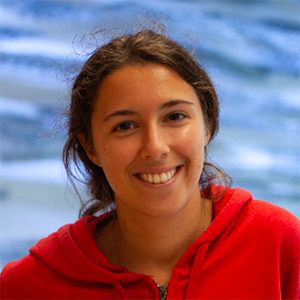 Virginie Sonnet shared her perspective as an international GSO student during the spring semester: “I’m from France and I was supposed to go back home for a month in June. At the beginning of the pandemic my parents asked me if I’d like to come back, but that wasn’t an option knowing I could not re-enter the U.S. By traveling, I would also have risked bringing them the virus, and France was on a strict lockdown so travelling was not easy. I’d say that in general, the COVID situation has put a lot of stress on international students as we are worrying about both the situation in the U.S. and in our home country, and about what we should do, what we want to do and what we can do. I’m not even talking about when the U.S. government considered requiring at least one in-person class to avoid cancellation of students’ F-1 visas. One good thing is that I’ve probably Skyped much more with my parents during the pandemic than I do in normal times!”
Virginie Sonnet shared her perspective as an international GSO student during the spring semester: “I’m from France and I was supposed to go back home for a month in June. At the beginning of the pandemic my parents asked me if I’d like to come back, but that wasn’t an option knowing I could not re-enter the U.S. By traveling, I would also have risked bringing them the virus, and France was on a strict lockdown so travelling was not easy. I’d say that in general, the COVID situation has put a lot of stress on international students as we are worrying about both the situation in the U.S. and in our home country, and about what we should do, what we want to do and what we can do. I’m not even talking about when the U.S. government considered requiring at least one in-person class to avoid cancellation of students’ F-1 visas. One good thing is that I’ve probably Skyped much more with my parents during the pandemic than I do in normal times!”
The SURFO Program Goes Virtual
The Summer Undergraduate Research Fellowship in Oceanography (SURFO) Program, which is funded by the National Science Foundation, was conducted online this year from June 8 to August 14. This 10-week research experience still had undergraduate science majors doing research under the mentorship of a GSO professor and GSO graduate students, but instead of staying in Narragansett, they stayed at their homes. The online format presented new challenges this year for the 13 students, but also new opportunities as several students conducted research where they lived.
Long-term Bay Monitoring Continues
Three long-running Narragansett Bay monitoring programs continued with few breaks and slight modifications.
The Marine Ecosystems Research Laboratory (MERL) kept the Narragansett Bay Fixed Site Monitoring Network going for its seasonal buoy water quality stations.
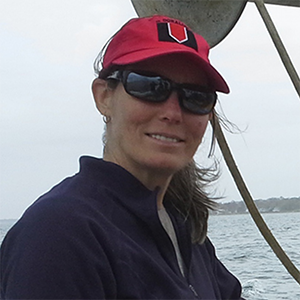 According to marine research specialist Laura Reed: “In March and April, when everything was changing so fast, we went out on the boat with our spouses. As we learned that masks helped keep the spread in check, we slowly increased the number of people on the boat. By the time the field season was in full swing we had enough staff on the boat to get the work done safely. There is also a level of trust involved—that the people you work with are all trying to keep each other safe, at work and in their daily lives.”
According to marine research specialist Laura Reed: “In March and April, when everything was changing so fast, we went out on the boat with our spouses. As we learned that masks helped keep the spread in check, we slowly increased the number of people on the boat. By the time the field season was in full swing we had enough staff on the boat to get the work done safely. There is also a level of trust involved—that the people you work with are all trying to keep each other safe, at work and in their daily lives.”
GSO’s weekly Fish Trawl Survey, ongoing since 1959, paused operations for two months after the trawl on March 16. The vessel remained in port until a new strategy for health and safety requirements could be developed.
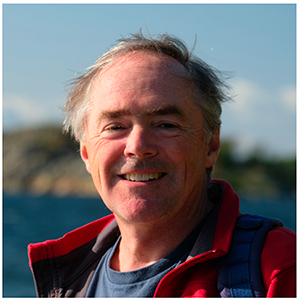 GSO professor Jeremy Collie, director of the trawl since 1998, explains: “The main concern was having sufficient safety protocols in place so no one would get sick and the trawl could continue without having to stop again.”
GSO professor Jeremy Collie, director of the trawl since 1998, explains: “The main concern was having sufficient safety protocols in place so no one would get sick and the trawl could continue without having to stop again.”
The Narragansett Bay Long Term Plankton Time Series never fully shut down, but from March 23, through the week of May 18, samples were taken from GSO’s pier at low tide.
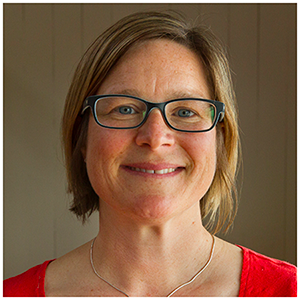 Tatiana Rynearson, the GSO professor responsible for the plankton time series, ongoing since 1957, praised project assistants, Jessica Carney and Vitul Agarwal. “They have been instrumental in the continued sample acquisition and analysis. Both encountered challenges due to COVID but found ways to adapt and make the best of a bad situation. This has been an awkward time to change over the duties associated with the time series, but they’ve both been very enthusiastic, and I am so appreciative!”
Tatiana Rynearson, the GSO professor responsible for the plankton time series, ongoing since 1957, praised project assistants, Jessica Carney and Vitul Agarwal. “They have been instrumental in the continued sample acquisition and analysis. Both encountered challenges due to COVID but found ways to adapt and make the best of a bad situation. This has been an awkward time to change over the duties associated with the time series, but they’ve both been very enthusiastic, and I am so appreciative!”
Lessons Learned about Climate Change
 Now dean emeritus, Bruce Corliss wrote to the Bay Campus community about the links between COVID-19 and climate change: “The COVID-19 crisis affecting the entire planet is likely a dress rehearsal for a much bigger event that has been unfolding over the last few decades. Global climate change will change the way that we live and create broader and longer-lasting uncertainty within the same areas of food security, financial stability and global health issues, and will affect populations differently depending on their resources and economic status. We now appreciate the effect of uncertainty and rapid change that can affect all levels of society, and those conditions will result from a rapidly changing climate. This is a lesson that we can take from COVID-19, and it underscores the need for the nation to address climate change in significant ways over the next decade.
Now dean emeritus, Bruce Corliss wrote to the Bay Campus community about the links between COVID-19 and climate change: “The COVID-19 crisis affecting the entire planet is likely a dress rehearsal for a much bigger event that has been unfolding over the last few decades. Global climate change will change the way that we live and create broader and longer-lasting uncertainty within the same areas of food security, financial stability and global health issues, and will affect populations differently depending on their resources and economic status. We now appreciate the effect of uncertainty and rapid change that can affect all levels of society, and those conditions will result from a rapidly changing climate. This is a lesson that we can take from COVID-19, and it underscores the need for the nation to address climate change in significant ways over the next decade.

